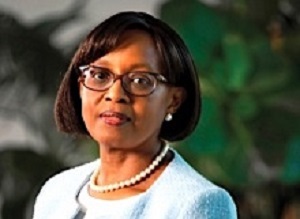Dr Matshidiso Moeti, the World Health Organisation’s regional director for Africa, has become the continent’s public face of the fight against the pandemic, writes the Mail & Guardian.
Every Thursday for the past month, journalists have dialled in from all over the continent to attend the virtual COVID-19 briefing by the World Health Organisation (WHO). The briefing is delivered from Brazzaville by Dr Matshidiso Moeti, the WHO’s regional director for Africa, who calmly details the latest developments in Africa’s fight to contain the coronavirus. According to a Mail & Guardian report, in doing so, switching effortlessly between English and French, Moeti has become the continent’s public face for this fight: a reassuring voice in the midst of our collective panic; an anchor in the gathering storm.
The report says it helps that she has seen this all before. During her decades-long career in public health, Moeti has battled two other major epidemics. Her worst experience, she says – worse even than the current pandemic – was confronting HIV/Aids. When it first appeared, in the 1980s, there was no treatment. “It was the sense of helplessness, of not being able to do anything about all these people dying,” she is quoted in the report as saying.
Eventually, Moeti found a way to help. In the early 2000s, she led the WHO’s pioneering “3 by 5” initiative – an effort to get antiretrovirals to 3m people in middle- and lower-income countries by 2005. Although it fell short of the target, reaching 1.3m people, the initiative is “widely credited with jump-starting the global effort to widen treatment access to people living with HIV in low- and middle-income countries”, according to the HIV/Aids-focused charity Avert.
Since being elected to her current position in 2015 – the first woman in the role – Moeti was also at the forefront of the WHO’s response to the Ebola outbreak in the Democratic Republic of the Congo.
There are some similarities between the response to Ebola and COVID-19, she says, especially around the need to convince people to change their behaviours. To contain Ebola, cultural practices like washing the dead before burial had to change; for COVID-19, it is about persuading people to take physical distancing seriously.
But other aspects of the current challenge are totally different. “When there was an Ebola outbreak, it was an African problem. This is a global problem. Some of the challenges (for Africa) relate to the fact that those countries from whom you would be expecting help are themselves struggling,” Moeti said in the report.
For that reason, it has been difficult to mobilise funding, equipment and technical assistance. And in some ways, the draconian border restrictions imposed in many African countries have been counterproductive for the WHO’s work, as they have restricted the organisation’s ability to move experts and supplies to the country’s that need them most. “Some of our countries simply don’t have the expertise needed to do things quickly enough,” Moeti said.
The report says Moeti was born in South Africa, growing up in the township of KwaThema near Springs, east of Johannesburg. Both of her parents were doctors. Her father was a member of the ANC Youth League, and she remembers when, as a small child, apartheid policemen stormed their home. They overturned bookcases and tore up the chicken coop, searching (in vain) for weapons.
Moeti was a precociously intelligent child. She was just 10 when she began high school at a boarding school in Eswatini (then Swaziland). It was partly to improve her educational prospects that the family moved to Botswana a year later. There, her mother helped to introduce family planning services, while her father became the smallpox commissioner for Southern Africa. In this capacity, he would verify suspected cases of the disease in Botswana; conduct assessments in other countries in the region; and was part of the global team trying to eradicate the disease completely.
Despite her parents’ enormous contribution to public health in the region, the report says Moeti was determined not to follow in their footsteps. “You know, when I was a 16-year-old, growing up with two doctors, I decided I did not want to be a doctor.” She laughs. Sure enough, she became a doctor. “When I ended up doing medicine, I decided I would definitely not get married to a doctor.” She laughs again. Moeti married a doctor, who works in public health.
After obtaining degrees in medicine and public health in London, Moeti joined Botswana’s health ministry as a clinician and public health specialist. From there she moved to the United Nations Children’s Fund and then the UN HIV/Aids programme. She joined the WHO in 1999, and has been there ever since. I
The report says in February, she was re-elected by the WHO executive board to a second term as regional director for Africa – a strong endorsement of the work she has been doing.
[link url="https://mg.co.za/africa/2020-04-08-mmeet-the-doctor-leading-africas-fight-to-contain-coronavirus-pandemic/"]Full Mail & Guardian report[/link]

